In a country where popular political leaders have publicly passed judgements on the character and veracity of rape victims, perhaps it is no surprise that sexual violence against women and girls has emerged as a national emergency.
In fact, according to a report published by the Sustainable Social Development Organisation (SSDO), nineteen women were raped every day in Pakistan last year. Amidst growing concerns over the safety of women in the country, the recent alleged rape of a college student in the capital city of the most populous province has continued not only to grip the nation’s attention but also to divide it.
The government insists that the case is nothing more than a disinformation campaign instigated by the opposition party. While the Lahore High Court, which has picked up the case, has yet to weigh in on the issue, if the authorities’ claims of a staged outcry hold water, then the longstanding injustice in how the country treats rape victims partly explains the impetuous response from the students in a province, where the CM’s porous redline of women and children’s safety has been crossed far too many times.
The suspected incident in Lahore, true or not, is emblematic of a deeper, pervasive problem. It is far from the first case to make headlines in a country where systemic flaws in law enforcement, a cultural obsession with women’s ‘honour’ and ‘purity’, and woefully low conviction rates have fostered an archaic social system—one that too often shifts the blame for sexual violence onto the victim rather than the perpetrator.
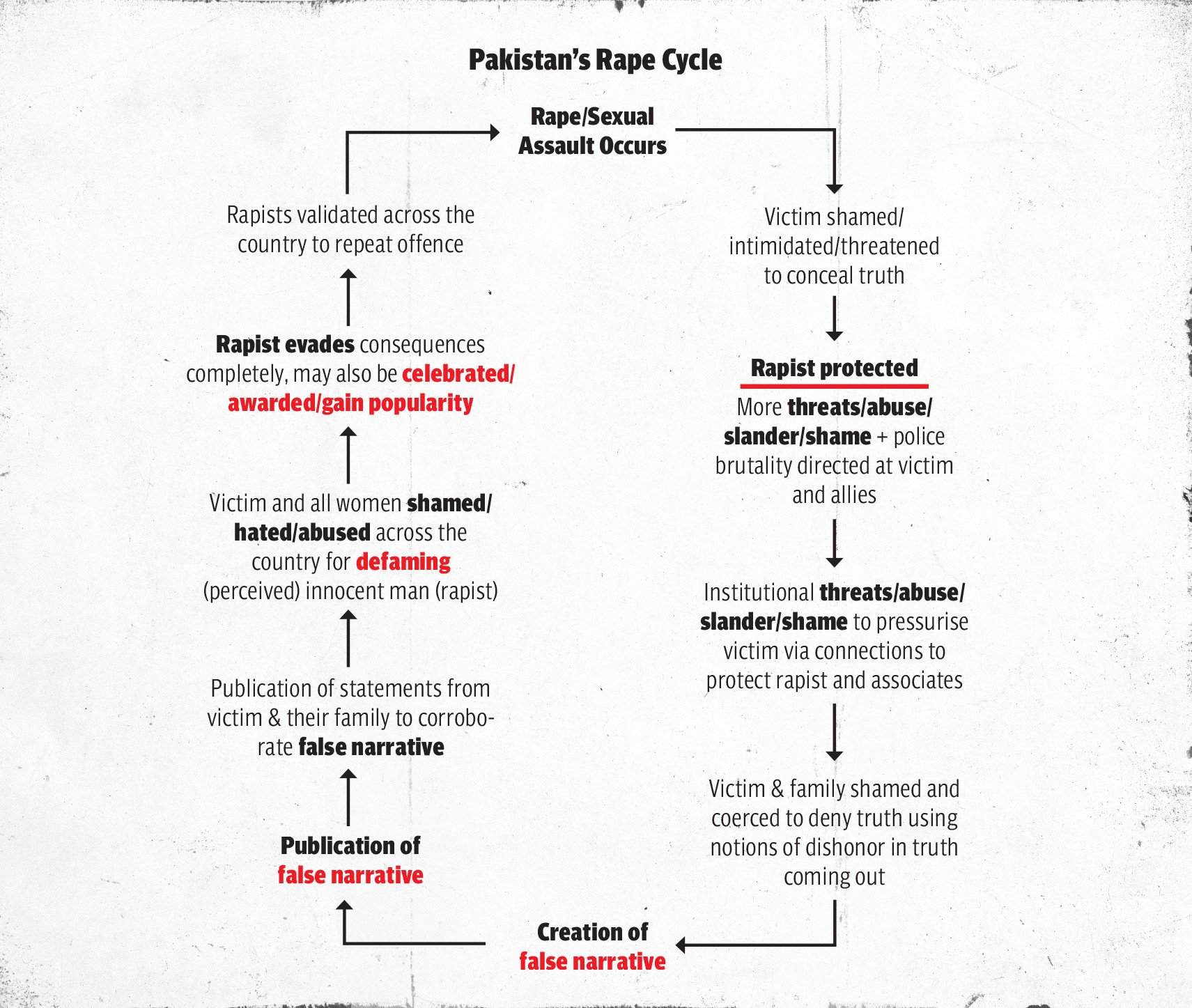
A peek into the statistics on rape in Pakistan reveals a disturbing trend: the country’s most populous province, Punjab, may be on its way to becoming a hub of sexual violence against women and girls, rivalling the capital of neighbouring India, New Delhi.
Data obtained from the SSDO further shows that a total of 29,747 incidents of sexual violence against women and underage girls were reported across the country during the past six years, with 7,010 cases identified in 2023, 94 per cent of which were reported from Punjab. The report further claimed that the conviction rate for perpetrators in incidents of sexual violence against women and children was less than five per cent.
While the shrinking attention spans of news consumers alongside mainstream media’s negligible coverage of gender-based violence, have largely succeeded in preventing the majority of these cases from catching the public eye, even the few cases that are highlighted by the media are not taken seriously by the law enforcement institutions. Hence, the government’s failure to set a strong precedent by improving the conviction rate for sex crimes has covertly allowed institutional mistrust to burgeon among the citizens, allowing disinformation to not only spread but also be believed.
“People with little or no trust in state institutions are easily swayed by disinformation, as a lack of faith in the government drives them to seek alternative sources of information. If the government’s disinformation claims hold true, the swift public belief in the rape report highlights a deeper issue: violence against women is widely perceived as common and, at best, ignored by governmental and law enforcement bodies,” noted Dr Melissa Beattie, an academic specialising in media studies.
Far from over, Pakistan’s rape nightmare extends beyond the narrative of a charged crowd misled by ‘disinformation’. It is a story of systemic failures, collective complacency, and pervasive apathy, which together have consistently failed the victims of rape.
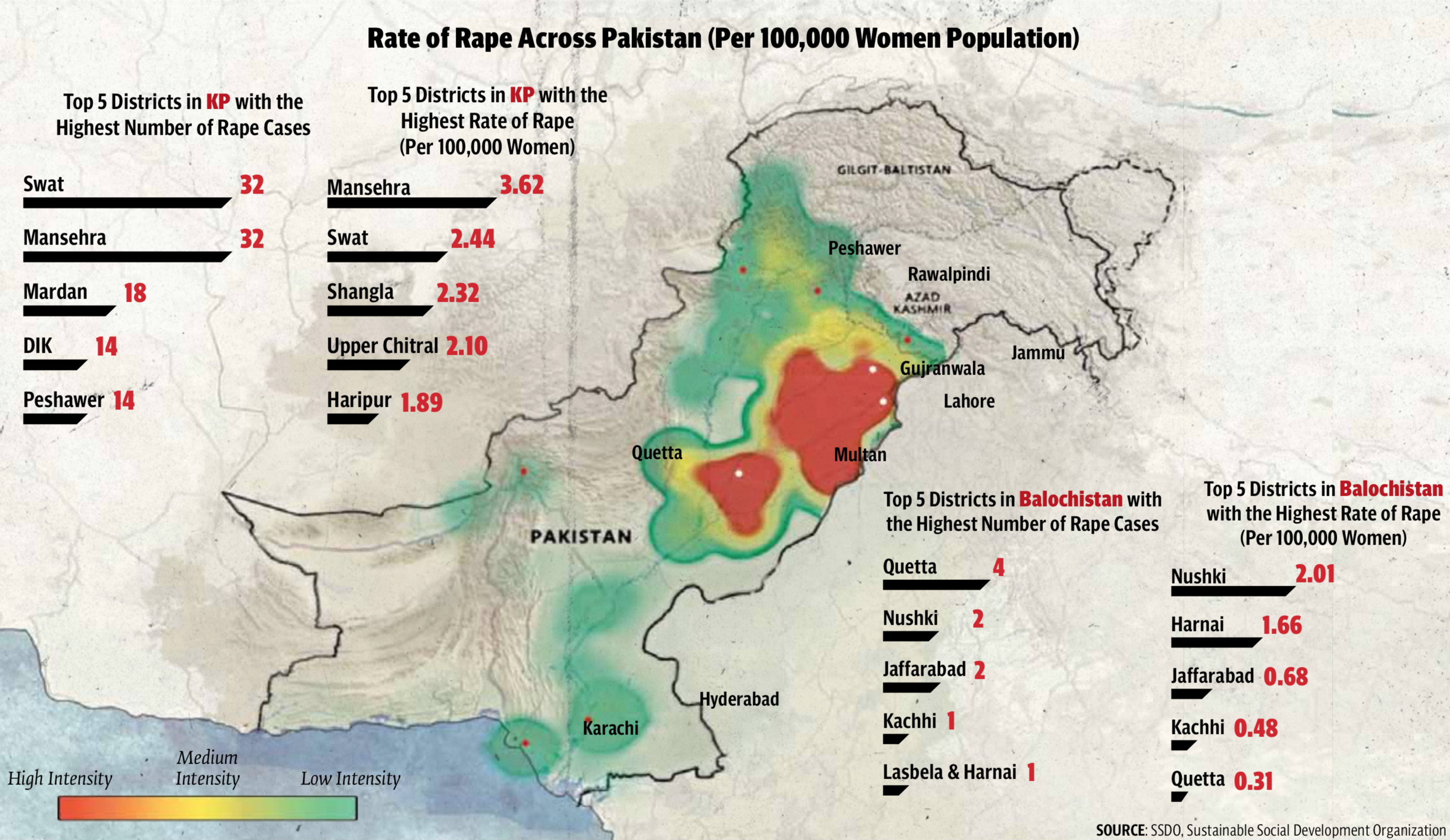
Weaponisation of language
Theories of feminist international relations dictate that true peace in the androcentric domain of governance can only be achieved once women and other gender minorities are offered male-dominated positions of power in mainstream politics. Yet the frail hopes of better representation fall crumbling to the ground, when a female incumbent unabashedly replicates the misogynistic rhetoric of the male leaders.
While sharing the findings of the recent investigation launched to probe the alleged rape case, Chief Minister Maryam Nawaz, who proudly flaunts the banner of being the first-ever female provincial administrator, casually passed an objectionable remark on the ‘purity’ of the suspected rape victim—a comment many believe to be, at the very least, insensitive and, at worst, outright ignorant.
Aiming her scorn at the press conference, Zahra Sabri, a Karachi-based academic who teaches South Asian history at Habib University, described the chief minister’s remarks as ‘toxic’ and inappropriate. “It is simply disgusting when a female minister, of all people, spews such a high volume of toxic, anti-women clichés in her press conference. Nawaz declared to the entire nation that the female student in question was not raped and is still ‘paak saaf’ (pure and unsullied) and that she belongs to a respectable family. What is this supposed to gesture to the people? That girls who suffer rape are no longer ‘pure’ and their families are not honourable?” criticised Sabri.
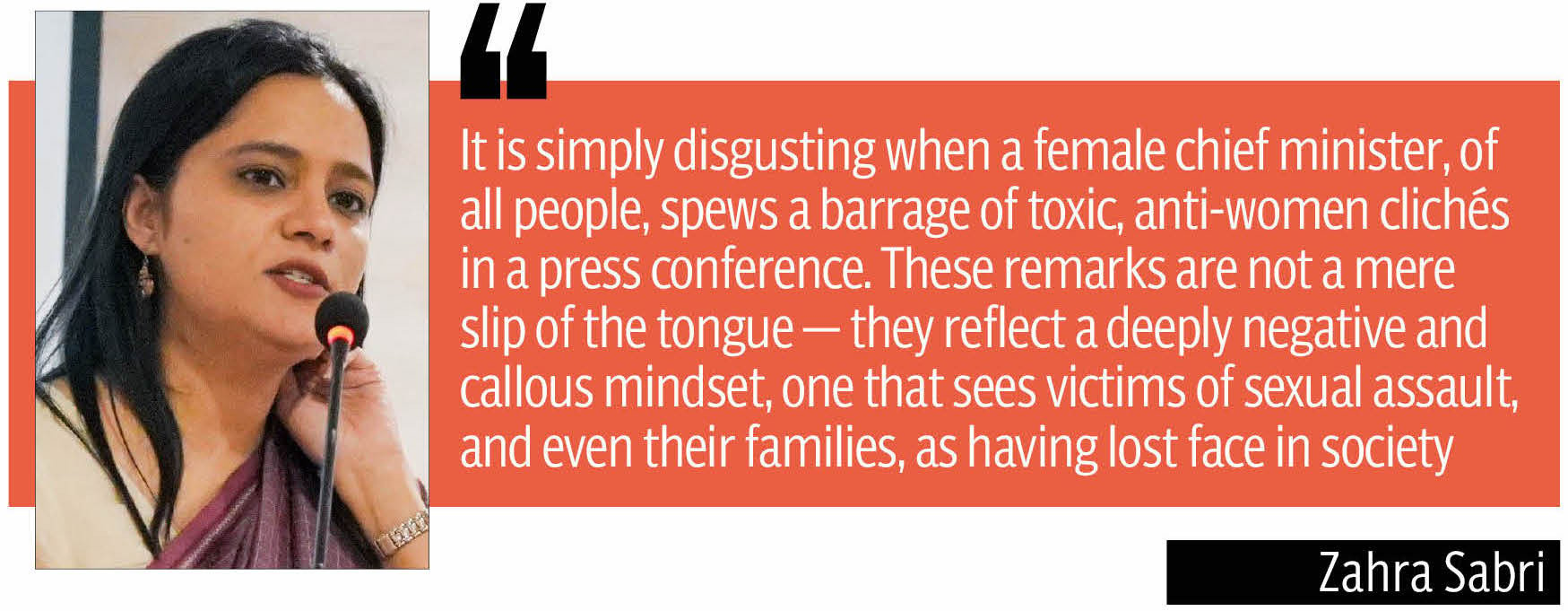
Unfortunately, this is not the first time an incumbent leader has weaponised misogynistic language to propel their own agendas. In 2005, former military ruler Pervez Musharraf, during an interview with a foreign agency over the gang rape of Mukhtaran Mai, unabashedly declared that rape allegations were monetised by women in order to attract money and obtain visas or citizenships of foreign countries. Though Musharraf never apologised for his remarks, Paul Martin, then Canada’s prime minister, rebuked the military leader on the sidelines of the UN General Assembly, calling his comments ‘unacceptable’ and describing violence against women as a blight that ‘besmirched all humanity’.
Not too long ago, former prime minister Imran Khan upon being questioned by a female anchor over rape incidents, also verbalised his belief that women's clothing incited men to commit rape since “women wearing fewer clothes had an ‘effect’ on men, unless they were robots.”
Explaining the trivializing attitudes of popular leaders towards sex crimes, Dr Raana Malik, Professor at the Gender Studies Department of the University of Punjab, said that the statements could be attributed to a lack of gender-sensitivity among politicians. “Gender-sensitive politicians can bring about better legislation and amendments regarding issues concerning women,” she opined.
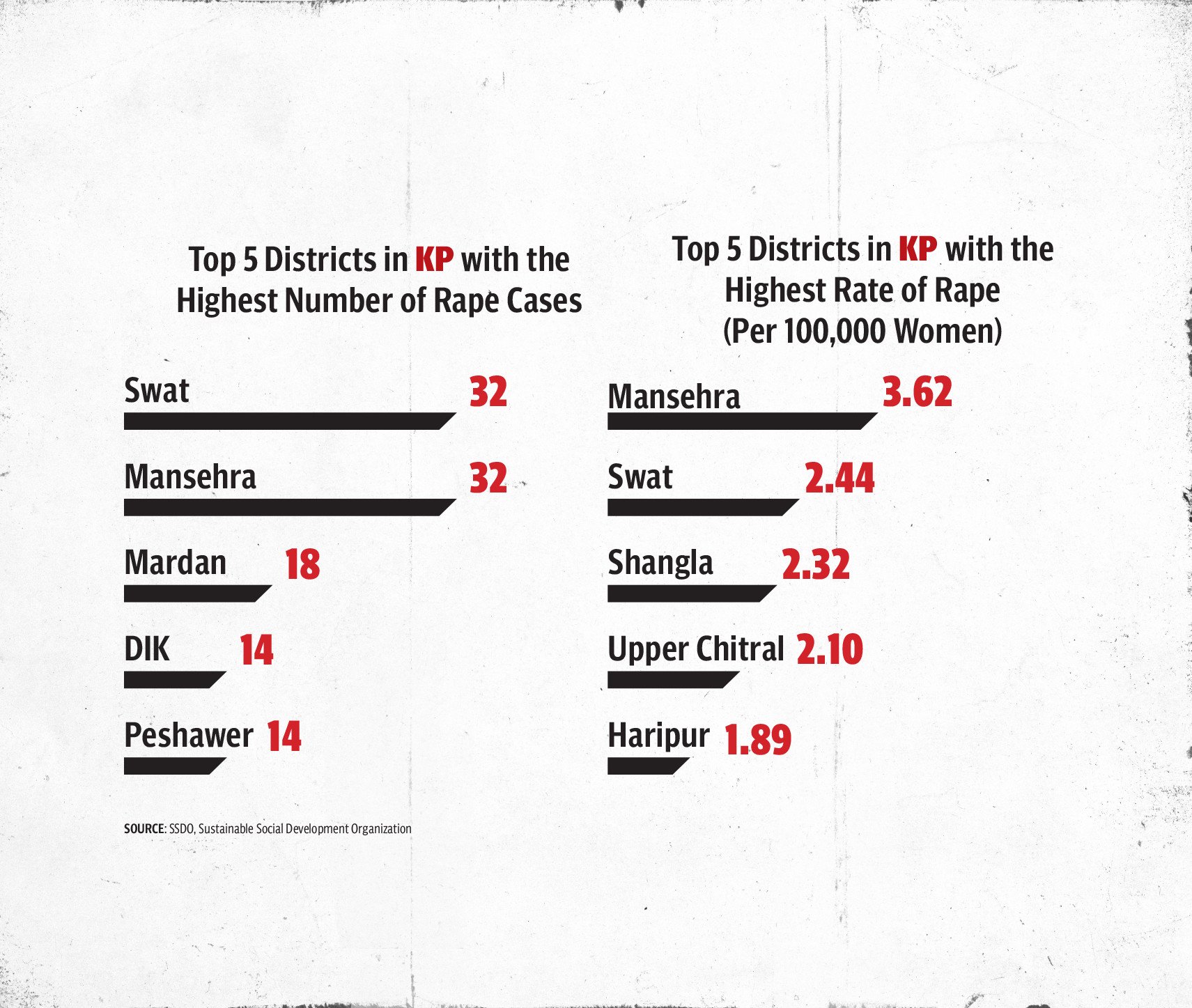
Flawed system
Like any other crime, rape cases require the collection of solid evidence before legal proceedings against the accused can be carried out in court. Unfortunately, the inherent errors and delays during the collection of evidence create ample legal loopholes for the accused to escape through a secret door.
Justice (Retired) Nasira Javed emphasised that having evidence was crucial for delivering justice to a victim of sexual violence. “First of all, in our hospitals, there is a lack of female medico-legal officers, which creates a hindrance in medical check-ups or DNA sampling. Additionally, there are delays in the testing of samples, which further weakens the case. Sometimes, evidence of the crime, which includes clothes of the victim or even the CCTV footage, is tampered. Altering or destroying evidence in any case is in itself a crime. All these factors are sufficient to undermine the case,” explained the former Lahore High Court Judge.
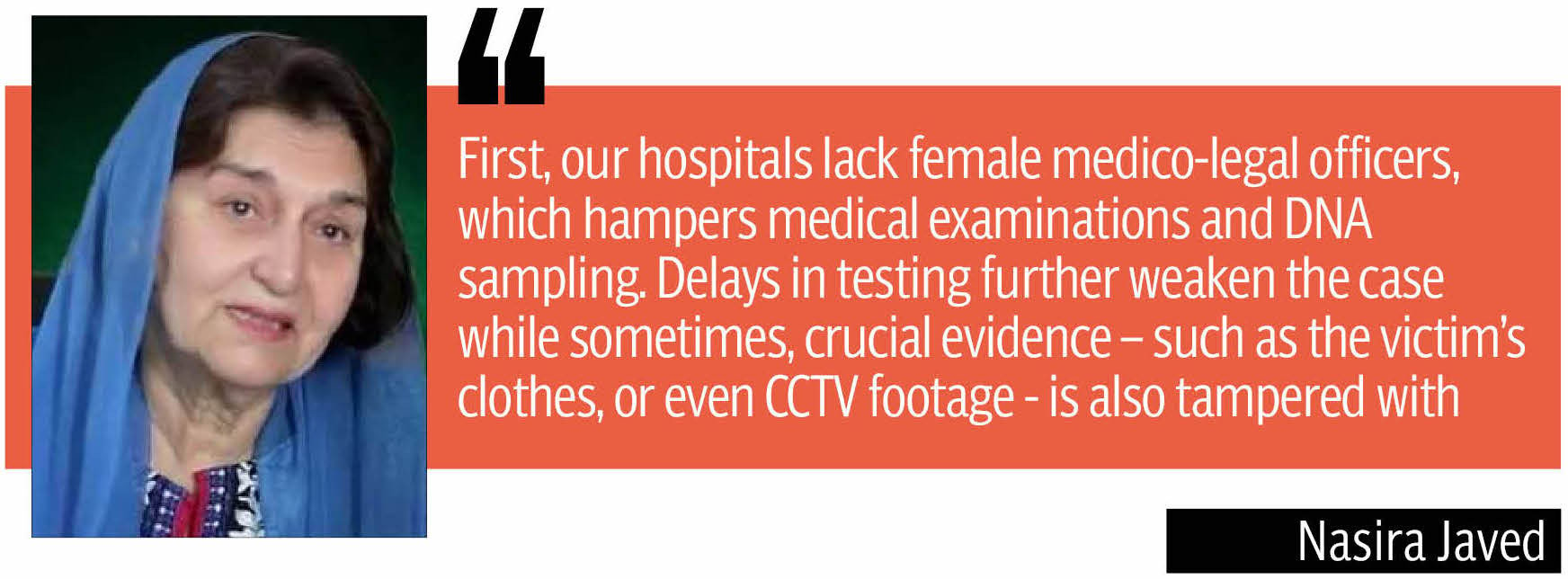
Javed said that all government hospitals should have arrangements for the medical examination of victims of sexual violence, but such mechanisms are lacking. “Our law mandates that the medico-legal procedures should not be conducted without the orders of the police. However, just as any patient receives immediate medical attention in an emergency, a woman who has been sexually assaulted should also undergo a prompt medical examination,” she added.
On the other hand, Rashida Qureshi, Program Coordinator at Search for Justice, a non-governmental organisation (NGO), was of the opinion that controlling incidents of rape was a significant challenge, requiring a comprehensive reform framework. “The first step is to ensure that victims are able to safely report cases of sexual assault. The second stage involves investigations, which often fail due to poor police performance, allowing many offenders to roam freely,” opined Qureshi.
According to Qureshi, the police often lack the necessary skills required to gather evidence, leading to the concealment of crucial facts and details. “Hence, it is essential to ensure the implementation of laws regarding rape and to provide necessary training to the police in order to bring the offenders to justice,” she added.
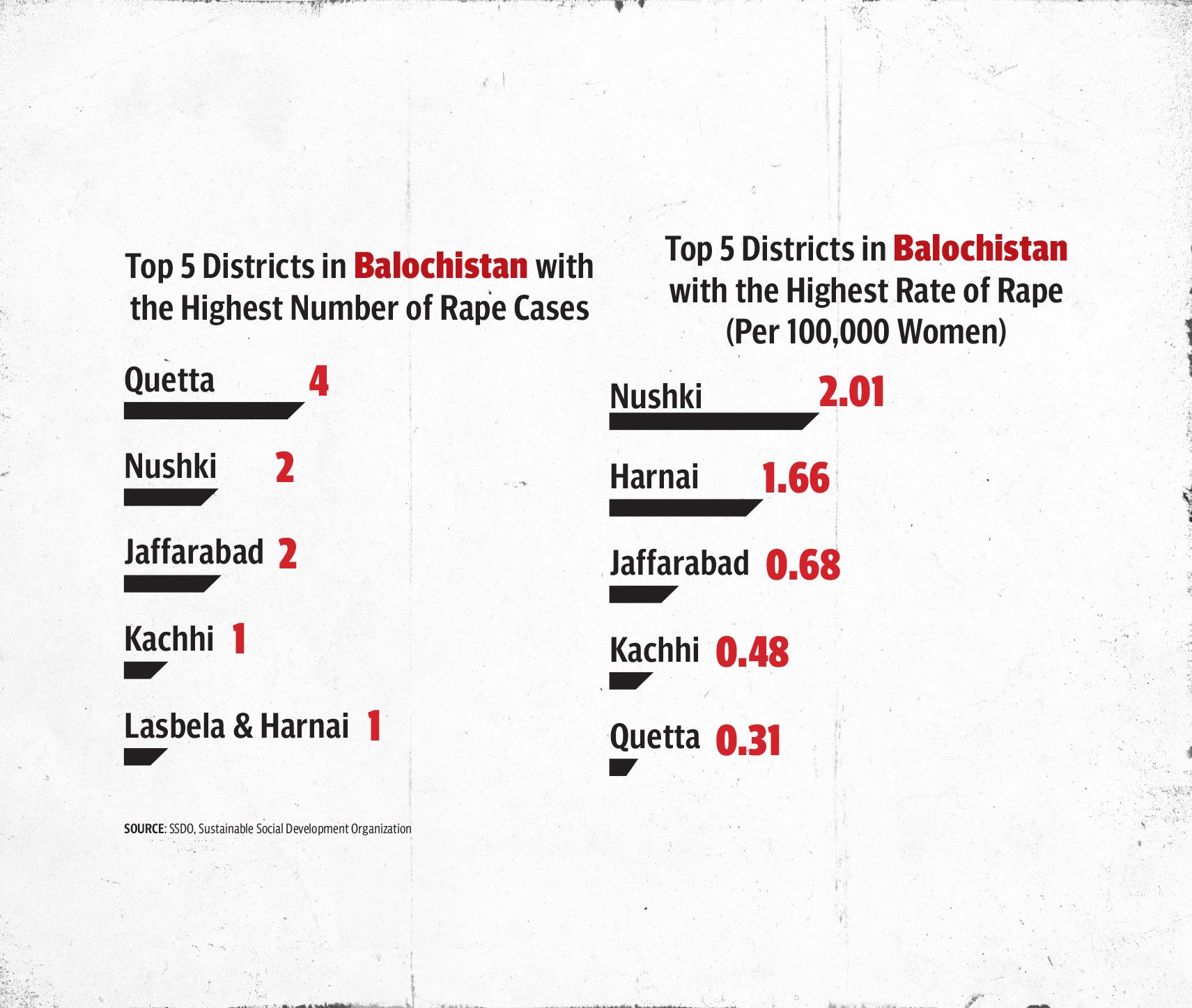
Blame the victim
“Like a compass needle that points north, a man’s accusing finger always finds a woman.”
Khalid Hosseini, in his award-winning book titled ‘A Thousand Splendid Suns’ wrote a very apt observation of a typical patriarchal society. Such is the outlook of the flag bearers of morality in Pakistan, who habitually blame the victim for being the victim in the aftermath of nearly every other rape case.
“In light of societal attitudes, rape victims are often pressurised to stay silent and label whatever happened as an ‘accident’. While there may be occasional protests against such incidents, it is frequently attempted to downplay the situation by claiming that it was not a premeditated crime but rather an uneventful happening. A crime is a crime, and when attempts are made to label a crime like rape as an accident, it exonerates the perpetrator,” claimed Nasira Iqbal.
Expanding on the matter, Javed also shed light on the role of patriarchy in preventing rape victims from coming to the fore and getting justice. “Often times, it is the male kin of the rape victim who decide what statement should be given to the police and what details should not be disclosed. Hence, the woman’s free will is restricted by her family’s decision,” said the former judge.
Seconding the veteran judge, Dr Raana Malik, felt that the essence of the problem is rooted in the society’s demeaning treatment of women as symbols of honour. “In our society, family honour is valued more than justice. Hence, whenever a woman suffers injustice or assault, it is the men who make her decisions. They decide whether legal action should be taken against the perpetrator, or the matter should be settled,” commented Dr Malik.
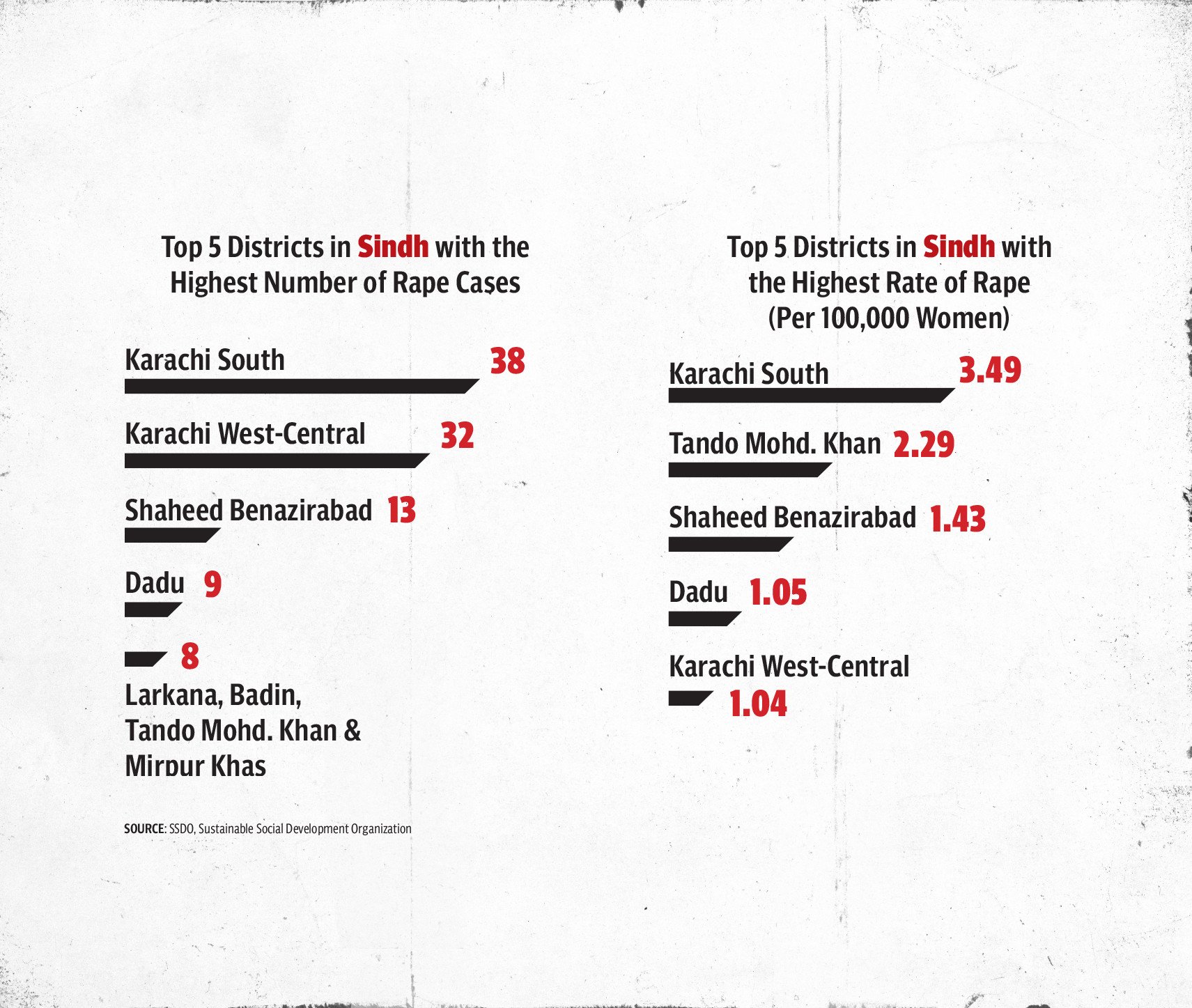
“If a victim comes from a wealthy family, she might have quicker access to police stations and courts, but if a woman belongs to an underprivileged background, she often cannot even think about seeking justice for the violence she has endured,” said Dr Malik.
On the other hand, Qureshi, while expressing her disapproval of the victim blaming culture, stated that it was unfortunate to see fingers pointed at the victim in cases of rape. “Whenever there is a robbery or murder, the victims are not questioned about why they did not resist or raise an alarm. But when a woman becomes a victim of sexual violence, her clothing, speech, and movements all are scrutinised,” asserted Qureshi, who revealed that even fully veiled women and deceased wrapped in burial shrouds have been raped. “Does that happen because of their clothing?” she questioned.
Agreeing with Qureshi, Dr Malik cited as an example the contentious comments made by the former Capital City Police Officer Umar Sheikh, who while speaking to the media in the aftermath of the Lahore-Sialkot Motorway rape incident of 2020, remarked that the victim should not have been out alone at midnight.
While commenting on the culture of victim blaming perpetuated by authority figures through the media, Dr Beattie, was of the opinion that officials’ tendency to victim-blame for sexual violence or VAW more generally should be explicitly called out in the press. “Although it is important to tell the public what an authority figure says, it is simultaneously essential to recognise the fact that they are espousing misogynistic sentiments and that they are wrong in doing so. Regardless of who spreads it, misogynistic discourses must be deconstructed for the news audience,” said Dr Beattie.
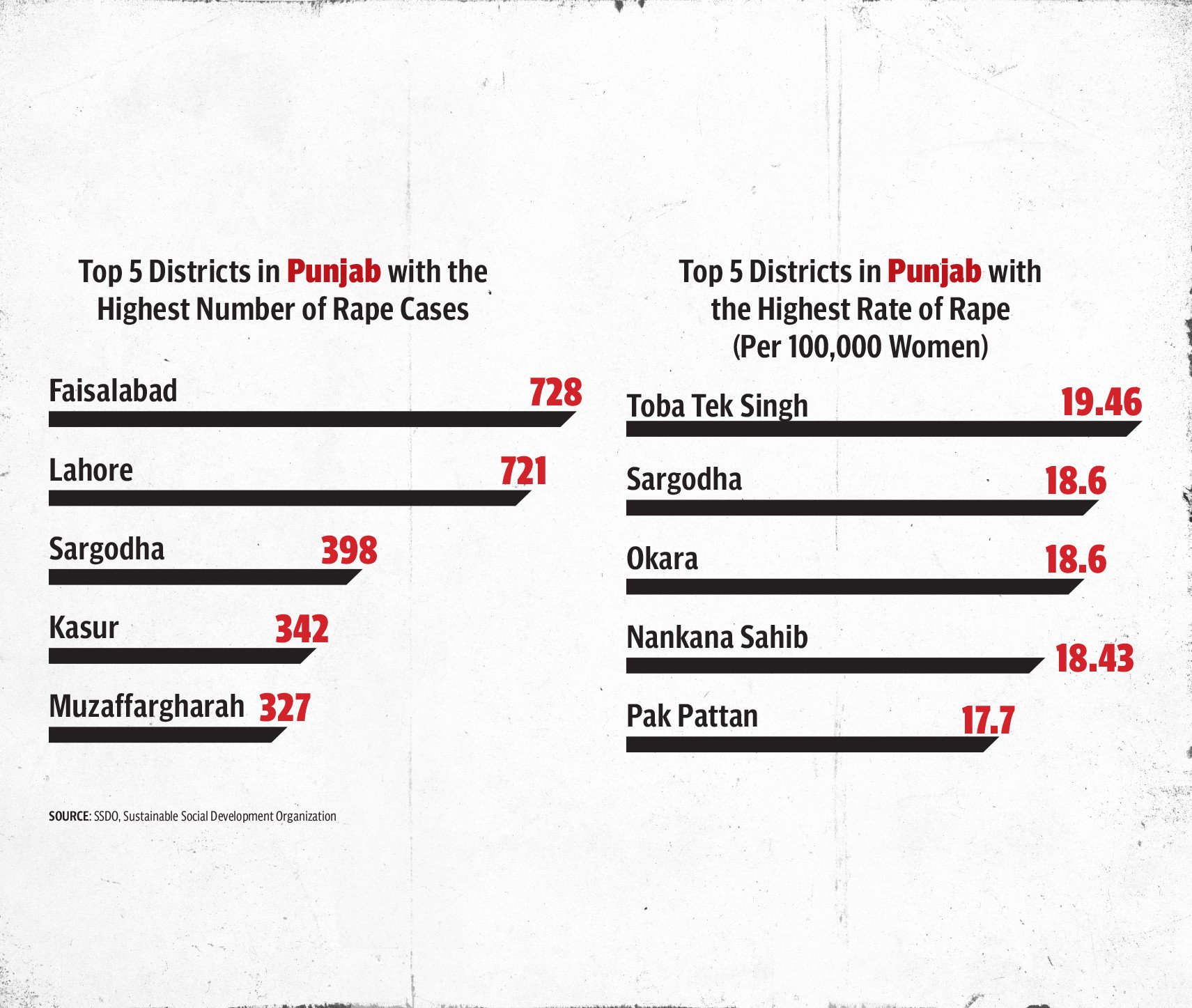
Media coverage and public apathy
Although media coverage of rape cases often triggers widespread public outcry, news outlets quickly abandon reporting on these incidents once the initial outrage fades and public attention shifts elsewhere.
“I think the media in most, if not all, countries must improve its coverage of gender-based violence. It can be more difficult in the Global South because many countries have flawed democracies, which makes criticising government and other officials potentially dangerous for the journalists or their publications. Similarly, the extended family of the victim and even those interviewed can also be negatively impacted,” said Dr Beattie.
Regardless of where in the world one is, Dr Beattie said, there is no quick fix to gender-based violence or institutionalised misogyny. “It will take a concerted effort by many brave individuals of all genders to recognise and openly confront misogynistic discourses in the many societies around the globe. There are many brave people doing so right now. The problem is that misogynists, like all people from dominant groups, tend to be so afraid of losing their own power that they refuse to listen,” observed the media expert.
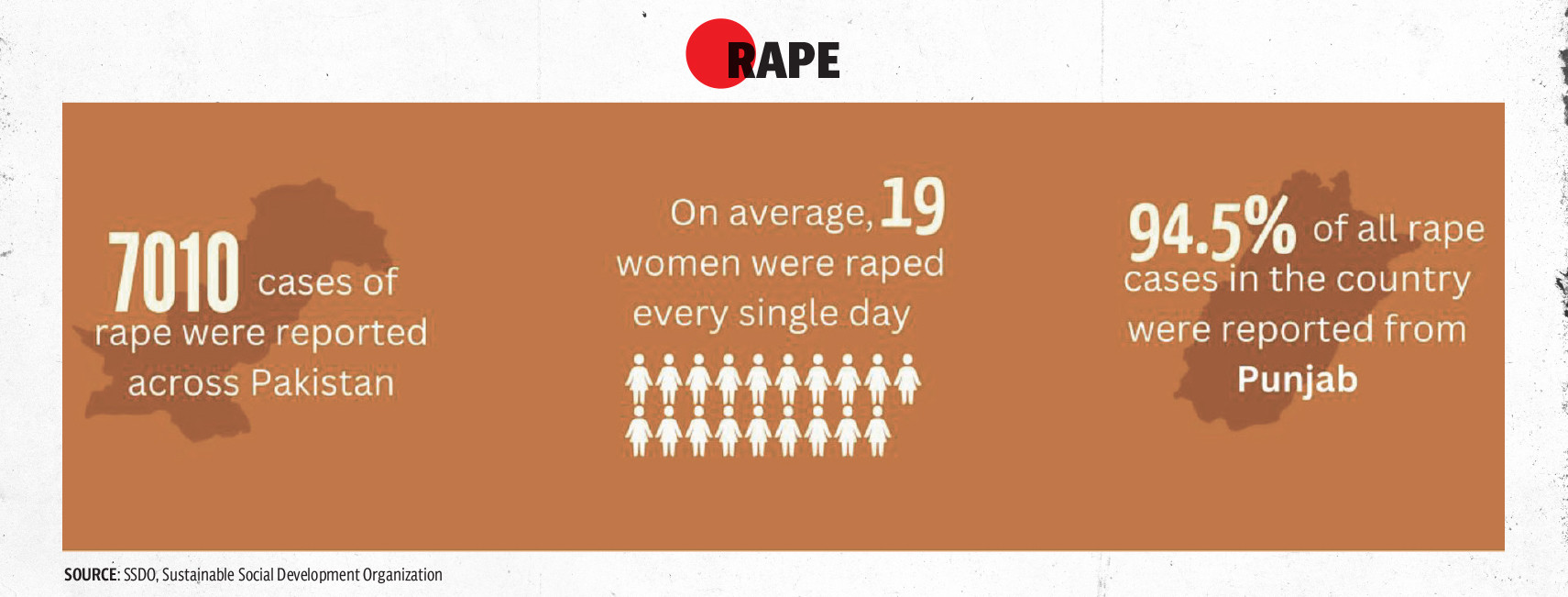
Forgotten empowerment
Amidst the alarming culture of violence against women, reducing female empowerment to economic independence alone distracts from other areas in society where women and girls continue to be subjugated under the guise of honour and culture, viewing half of the country’s citizens not as human beings but as objects of ownership.
Dr Malik believed that empowering daughters also meant changing the traditional mindsets, a task which was incomplete without educating sons. “Our centuries-old thinking, which views women in terms of ‘honour’ must be abandoned. For this, we need to alter the mindsets of our children from a young age, especially our sons at home, so that once they step outside the house, they know how to treat women with respect,” said Dr Malik, who emphasised the need for changes in the educational curriculum and hiring of teachers to ensure a gender-sensitive education to students.
“It is important to improve the overall education on gender, including relationship education, which pertains to rules of consent. A more diverse press corps and editorial staff might also help bring gender issues to the forefront. This will help normalise it as part of everyday discourse in the newsroom and in the articles or other content produced,” seconded Dr Beattie, an academic expert on media.
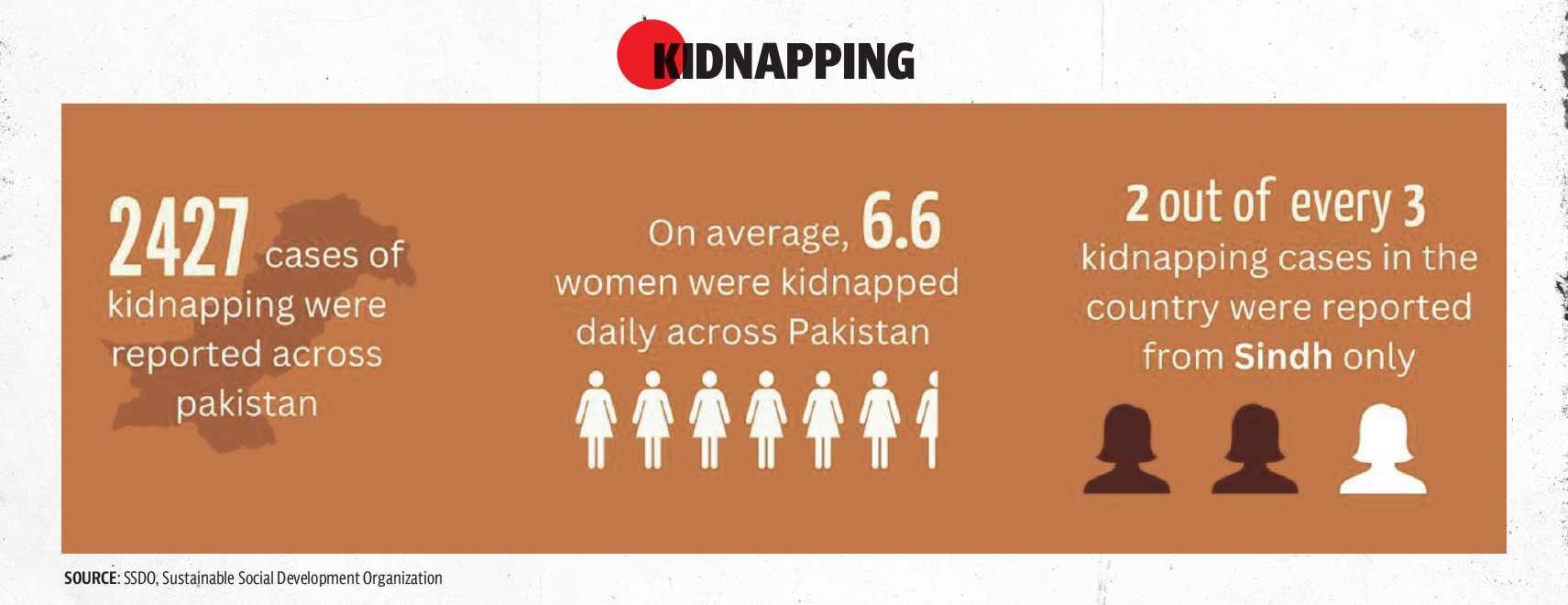
The regional rape epidemic
Although each state has its own unique laws for curtailing gender-based violence, the rise in cases of rape has also bedevilled both India and Bangladesh over the past decade, exposing the inherent flaws in the criminal justice system that plague nearly all countries across the subcontinent.
In August this year, the brutal rape and murder of a trainee doctor at a government medical college in India, sparked massive protests across the neighbouring country. What fuelled the public outcry further was the college administration’s disgraceful decision to cover up the matter by declaring it a suicide.
Similarly, in 2022, a bishop accused of raping a nun repeatedly over a two-year period was acquitted by a court on the grounds that no solid evidence of the assaults could be found amidst intense uproar by the civil society.
Another prominent case, which ruined the international repute of India, was the 2012 Nirbhaya case, where a 23-year-old intern was atrociously gang raped by six men while travelling at night through a bus. The victim succumbed to her injuries soon after. Despite national outrage, it took the government nearly eight years to carry out the executions of the convicted rapists.
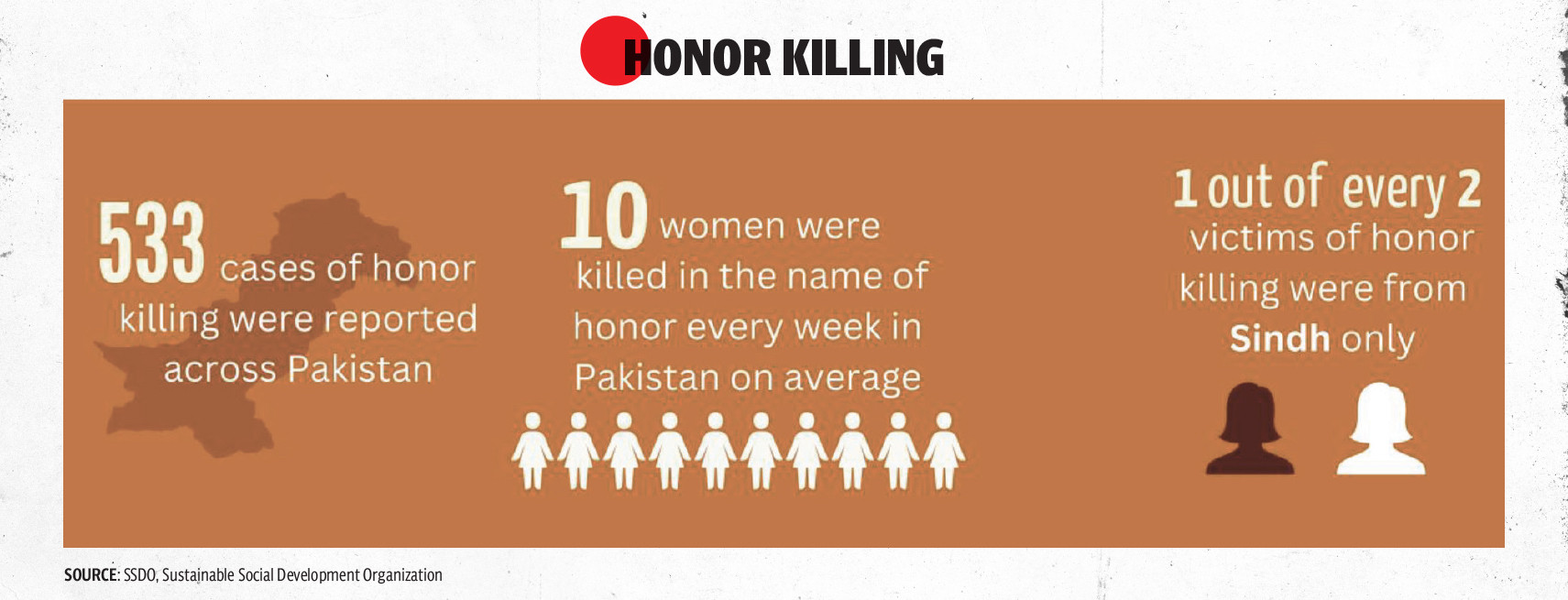
According to data obtained from Reuters, cases of rape increased from 25,000 in 2012 to 39,000 in 2016 until one woman reported rape every 15 minutes in India in 2018. Since then, the annual number of rape cases has averaged above 30,000 yet the conviction rate remains fairly low between 27 to 28 per cent.
In Bangladesh too, high rape cases and a low conviction rate is a common occurrence as a report published by the Al Jazeera revealed that only 3 per cent of rape accused were convicted by court. Moreover, death sentences were announced to five men in 2020, eight years after they had been accused of raping a 15-year-old girl. For the current year, Ain o Salish Kendra (ASK), a Bangladeshi human rights organisation reported that 329 women had been raped so far, 22 of who had died due to the violence while 7 others had committed suicide.
Expressing her opinions on whether Pakistan was following a similar trajectory of injustice against rape victims, former Lahore High Court Judge Nasira Javed voiced her deep concern over the increasing incidents of rape in the country. “It is essential not just for the government but also for civil society to play its part in curtailing sex crimes. Pakistan has strict laws against sexual violence, but the real issue lies in their implementation. If anyone raises their voice against such incidents, attempts are made to silence them,” she lamented.
